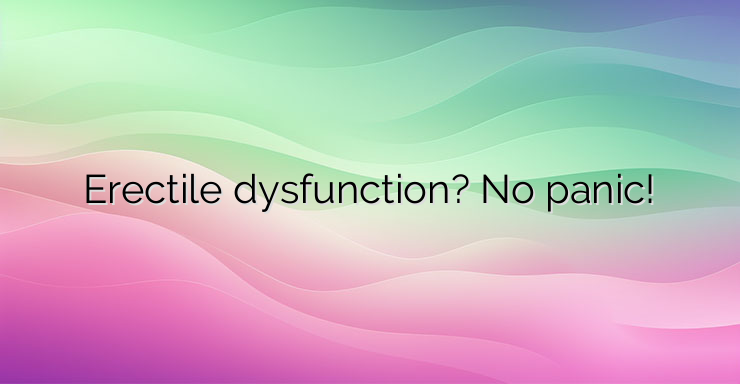The term “erectile dysfunction” has come into widespread use, and many men are horrified at the mere thought of this “scary” diagnosis. Due to the sensitivity of the subject and the frequent reluctance to discuss it openly, many myths and legends have arisen about it. Let’s strip away the folklore and get to the heart of the matter. It is well known that an erection is a hydrostatic effect of the entry of blood into the corpora cavernosa of the penis, which in turn is under nerve control – sexual stimulation causes nerve impulses to be sent to the corpora cavernosa. Under the influence of these pulses, nitric oxide (NO) is synthesized in them, which causes them to relax and fill with blood. Sufficiently high levels of testosterone in the blood are also necessary, as its metabolite dihydrotestosterone is also involved in signal transmission. Quite naturally, the physiological mechanism of erection and its disorders are the first thing that is “checked” when disturbances occur. So, in cases where it is not a question of psychologically conditioned impotence, either due to stress or some strong emotions, the two main “suspects” for the appearance of the physiological – cardiovascular and neurological diseases – come to the fore. From the group of cardiovascular diseases, coronary heart disease and peripheral vascular disease are most often diagnosed in patients with erectile dysfunction. Both conditions are associated with narrowing of the arteries by cholesterol plaques and/or inflammation of the vessel wall. In coronary heart disease, these changes occur in the arteries that supply blood to the heart and, as a result, reduce its ability to pump blood to the periphery of the body. In peripheral vascular disease, the opposite is the case – the arteries in the periphery of the body are narrowed, as a result of which the blood supply to the relevant organs is reduced. It is clear that high cholesterol levels are a risk factor for both cardiovascular problems and erectile dysfunction. What is perhaps less obvious, however, is that the same applies to diabetes, obesity and smoking, which in one way or another contribute to vascular changes. Neurologically determined erectile dysfunction can be due to brain or spinal cord trauma, stroke, neurodegenerative diseases such as Parkinson’s or Alzheimer’s disease, multiple sclerosis, nerve damage during prostate surgery, etc. In older men, it is natural to suspect a drop in testosterone levels. If this indeed turns out to be the underlying cause, androgen therapy is resorted to, where testosterone is procured in the form of patches, injections, etc. Of the medical causes of erectile dysfunction, the antidepressants from the group of selective serotonin reuptake inhibitors (often referred to as SSRIs) are undoubtedly in the first place.which, by the way, are also one of the most prescribed and used drugs of all time. NEWS_MORE_BOX Their most common side effect is the occurrence of sexual dysfunction in both sexes. In women, it manifests itself as reduced libido and anorgasmia (failure to achieve orgasm), and in men – as difficulty in obtaining an erection, difficulty in ejaculation and a reduced feeling of pleasure when it occurs. Fortunately, in the vast majority of cases, these effects go away when the antidepressants are stopped. It must also be said, and with great relief, that modern medical science offers a solution to erectile problems. When reducing weight and increasing physical activity do not give the desired result, medications from different pharmacological groups are resorted to, each of which has its own advantages and disadvantages. These are most often phosphodiesterase inhibitors (vardenafil, tadalafil and sildenafil), substances from the group of prostaglandins (alprostadil), the already mentioned hormone replacement therapy in men, etc. Which of the many alternatives is most suitable in the particular case is decided by the attending physician. Perhaps, when you clarify the reasons for its appearance, you will see that there is nothing shameful about erectile dysfunction and it does not make a man less of a man. Instead, he should seek the advice of a physician who, bound by the Hippocratic Oath to render aid and by medical ethics to maintain complete confidentiality, will help him fully enjoy the joys of life.will help him fully enjoy the joys of life.will help him fully enjoy the joys of life.


Leave a Reply